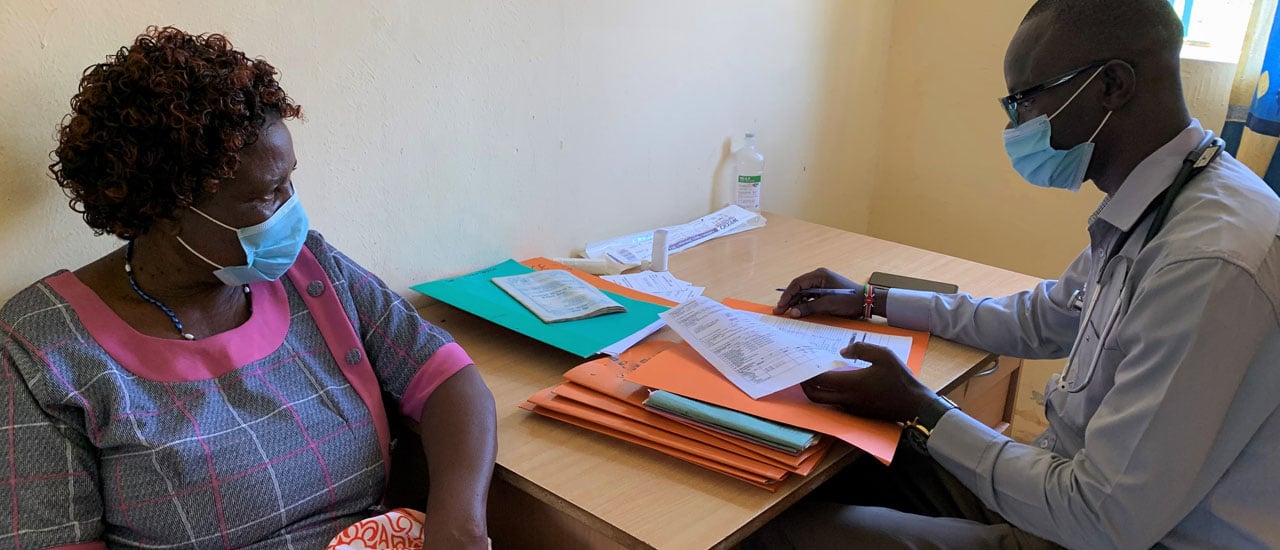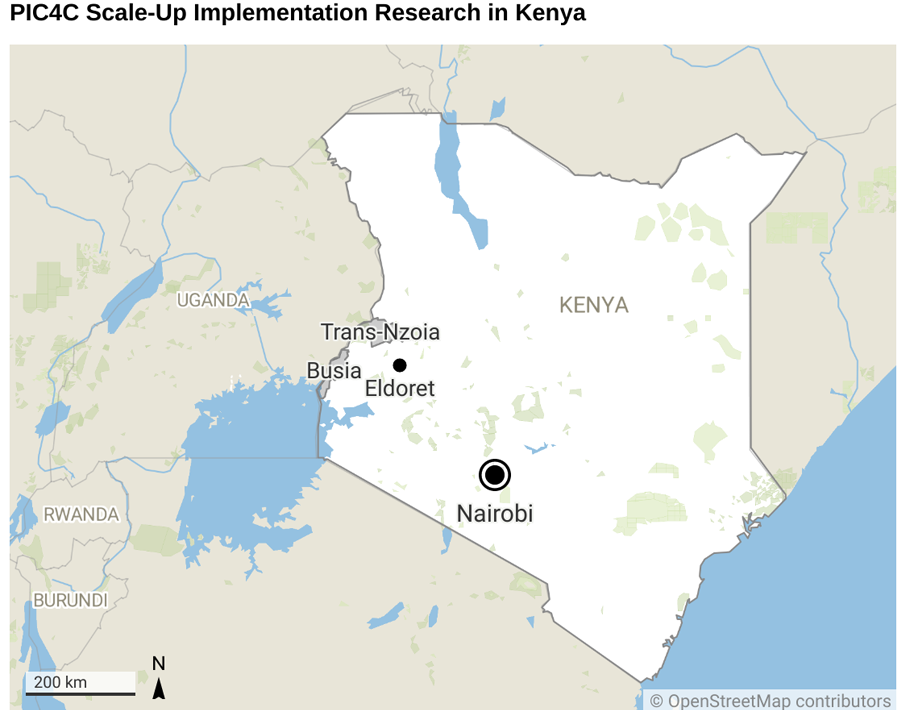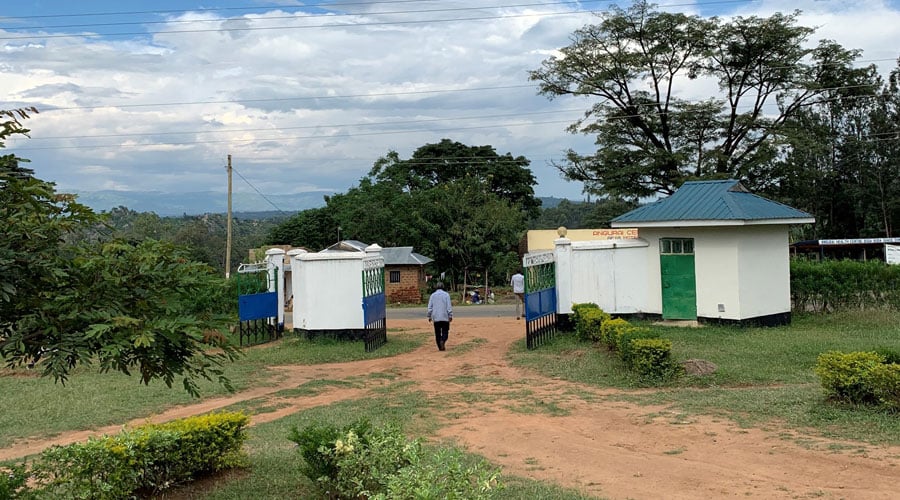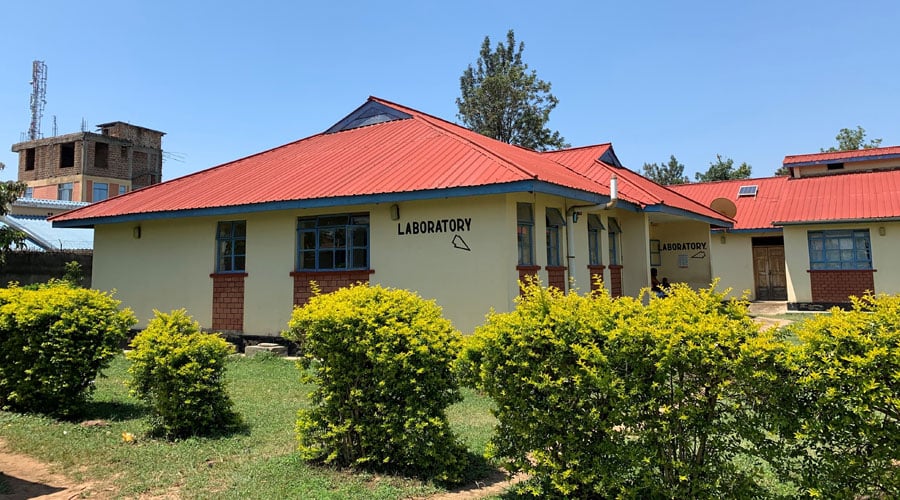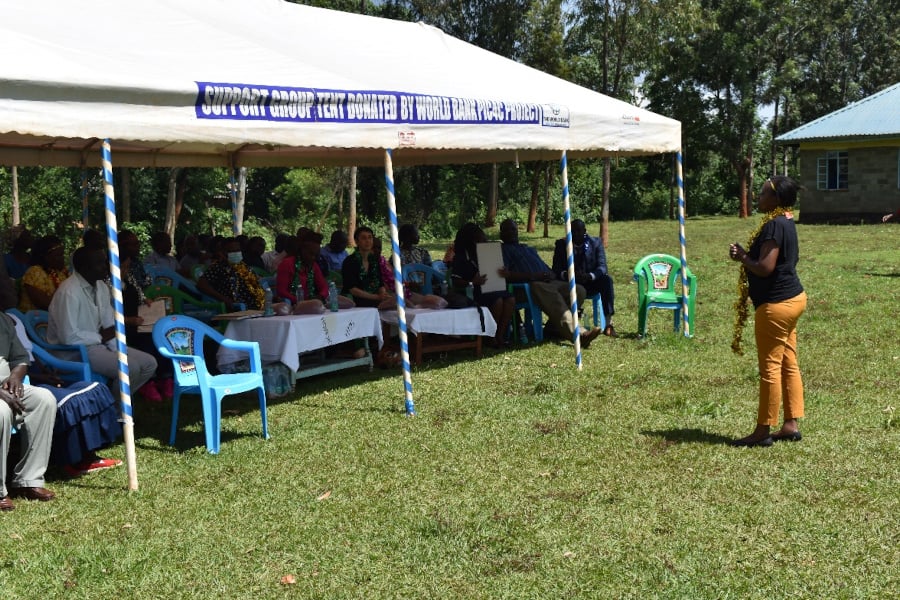The ‘Primary Health Integrated Care Project for Chronic Conditions’ (PIC4C) is being piloted in Busia and Trans Nzoia counties in Western Kenya to improve the timely detection, treatment and management of people with hypertension, diabetes, cervical and/or breast cancer in the community. It also aims to link patients with a voluntary insurance package for in- and outpatient services operated by the National Hospital Insurance Fund (NHIF) to protect people from the costs of ill health. PIC4C is based on learning from the Academic Model Providing Access to Health Care (AMPATH) HIV care model. It is supported by the World Bank through the Access Accelerated Initiative.
PIC4C Scale-Up brings together researchers from the London School of Hygiene & Tropical Medicine (UK), MOI University and the KEMRI-Wellcome Trust Research Programme in Kenya and aims to inform and support scale up of the PIC4C model for the integrated management of people with hypertension, diabetes and breast and cervical cancers in Kenya and beyond.
Our PIC4C SCALE-UP objectives are:
- To understand the implementation process.
- To understand the experiences of patients to assess whether and how well the PIC4C model meets the needs of those affected by the selected NCDs.
- To assess the health benefits, and potential unintended consequences of the implementation of the PIC4C pilot.
- To evaluate the effectiveness of the National Hospital Insurance Fund (NHIF) chronic care benefit package.
These are addressed in three Work Packages.
PIC4C Scale-Up is supported by the Global Alliance for Chronic Diseases research programme and funded by the Medical Research Council (MR/T023538/1)
The Primary Health Integrated Care Project for Chronic Conditions (PIC4C) has been developed through partnership between the AMPATH Consortium, Moi University, Moi Teaching and Referral Hospital, the Kenyan Government, and the World Bank.
PIC4C Scale-Up is a partnership between Moi University College of Health Sciences (MUCHS), KEMRI-Wellcome Trust Research Programme and London School of Hygiene & Tropical Medicine (LSHTM) Centre for Global Chronic Conditions (CGCC).
- MUCHS/AMPATH PIC4C Scale-Up Team
-
Moi University College of Health Sciences (MUCHS) is Kenya's second largest medical institution. The college fosters community-based education and health services to urban and rural health centres with its major affiliated teaching institution being Moi Teaching and Referral Hospital (MTRH). MUCHS works closely with AMPATH, a partnership between MUCHS, MTRH, in Kenya and U.S. Medical Schools headed by Indiana University School of Medicine.
MUCHS/AMPATH provide supervision and expertise in implementation research and project implementation, clinical care in the region, local expertise in qualitative methods and oversight of clinical, qualitative and quantitative data collection.
- Dr. Jemima Kamano: Co-Principal Investigator
- Professor Violet Naanyu: Co-Investigator
- Dr. Nicholas Kirui: Co-Investigator
- Hillary Koros: Study Coordinator [to February 2022]
- Richard Mugo: Data manager and Biostatistician
- Alex Njumwah: Assistant Data Manager
- Keviner Asigi: Research Assistant
- Tobista Nafula: Research Assistant
- Ruth Nahema: Research Assistant
- Elizabeth Khisa: Research Assistant
- Shameem Mutalib: Research Assistant
- Peter Gituro: Driver
- KWTRP PIC4C Scale-Up Team
-
The KEMRI-Wellcome Trust Research Programme (KWTRP) is a collaborative research programme between the Kenya Medical Research Institute, the University of Oxford, and the Wellcome Trust. One of Africa’s leading health research institutes, KEMRI-WT is a centre of excellence in health research with strong links with local and national Government. The programme’s health economic research unit focuses on costing and economic evaluation of healthcare interventions, health financing and health system governance.
KWTRP leads the health financing research component of PIC4C Scale-Up and provides technical expertise in the evaluation of health outcomes.
- Dr. Edwine Barasa: Co-Principal Investigator
- Dr. Anthony Etyang: Co-Investigator
- Dr Vincent Were: Co-Investigator
- Robinson Oyando: Research Officer
- LSHTM PIC4C Scale-Up Team
-
The London School of Hygiene & Tropical Medicine (LSHTM) Centre for Global Chronic Conditions (CGCC) is a world leading centre for research in global health, with over 1000 multidisciplinary research staff based in London and overseas. The Centre for Global Chronic Conditions includes researchers from different disciplines with the aim to address chronic conditions through an integrated approach.
LSHTM provides expertise in implementation research methods for chronic conditions; comparative health systems and implementation research, qualitative methods, integrated care, and policy dialogues; information technology services, statistical analyses; qualitative research; and health financing.
- Professor Pablo Perel: Co-Principal Investigator
- Professor Ellen Nolte: Co-Principal Investigator
- Professor Anthony Gasparrini: Co-Investigator
- Dr Adrianna Murphy: Co-Investigator
- Professor Kara Hanson: Co-Investigator
- Dr Ruth Willis: Social Scientist
- Mr Triantafyllos Pliakas: Epidemiologist and Data Scientist
- Mari Tanaka: Project Coordinator
- Advisory Committee Members
-
- Professor Robert Tenge Kumeru: Advisory Committee, MUCHS
- Professor Winstone Nyandiko: Advisory Committee, AMPATH
- Dr Jane Chuma: Advisory Committee, World Bank
- Dr Ephantus Maree: Advisory Committee, MoH
- Professor Carl May: Advisory Committee, LSHTM
PIC4C Scale-up is delivered through three complementary work packages.
Work Package A
Work Package A focuses on Objectives 1 and 2:
- To understand the implementation process.
- To understand the experiences of patients to assess whether and how well the PIC4C model meets the needs of those affected by the selected NCDs.
Our research seeks to answer the following questions:
- How well is PIC4C being implemented?
- What are the factors that enable or hinder the likelihood of the PIC4C model being sustained long-term?
- What are the key requirements for successful scale up, including the role of the social and economic context in which the pilot is being implemented?
We do this through two strands of work:
a) In-depth interviews with (i) health workers and (ii) decision makers at three points in time.
b) A cross-sectional survey of patients who are newly diagnosed with diabetes and/or hypertension and in-depth interviews with a sub-sample of patients at three points in time following the initial survey.
Work Package B
Work Package B focuses on Objective 3: To assess the health benefits, and potential unintended consequences of the implementation of the PIC4C pilot.
We will use the AMPATH Medical Record System (AMRS), in which each patient has been assigned a unique universal identifier and which is used in the management of their care across all levels. Primary outcomes are systolic blood pressure and fasting glucose; we will also collect data on HIV viral suppression (<1000 copies/ml), process outcomes, and potential confounders at facility and individual level. Based current AMRS data we estimate that approximately 13,000 patients with hypertension, 4,000 with diabetes, and 2,000 with diabetes and hypertension will fulfil the inclusion criteria and be included in the analysis.
Work Package C
Work Package C focuses on Objective 4: To evaluate the effectiveness of the National Hospital Insurance Fund (NHIF) chronic care benefit package.
The overarching objective of this study is to examine the effectiveness of the NHIF national scheme as a financing and purchasing mechanism for selected chronic diseases in Kenya.
Specific objectives
- Measure the effectiveness of the NHIF national scheme benefit package to provide financial risk protection to individuals with chronic diseases
- Examine the extent to which the NHIF national scheme benefit package is responsive to the needs of individuals with hypertension, diabetes, cervical and breast cancer
- Examine how the provider incentives generated by provider payment arrangements of the NHIF national scheme benefit package influence equity, efficiency, and quality of care
We employ a mixed methods approach that combines a quantitative cohort design, and a cross-sectional qualitative study.
Members of the PIC4C Scale-Up team participated in the Non-Communicable Diseases (NCDs) Stakeholders Forum: Dissemination of Ampath NCD Projects PIC4C, STRENGHTS, PIC4C Scale-Up and Population Health, hosted by the Ministry of Health in Kisumu City on 9-12th May 2022. The Meeting Objectives were:
- Disseminate findings of the PIC4C end term evaluation
- Disseminate best practices from the PIC4c project
- Sensitize on preliminary findings of the PIC4C Scale Up Project
- Disseminate preliminary findings of the Strengths Project
- Start initial development of a road map on NCD integration in primary health care model
- Knowledge sharing with other partners on NCD integrated models
Following the meeting, participants were kindly invited to visit Nambale Sub-County Hospital, the Revolving Fund Pharmacy at Khunyangu Sub-County Hospital, and to meet with Patient Support Group members at Ikonzo Dispensary.
